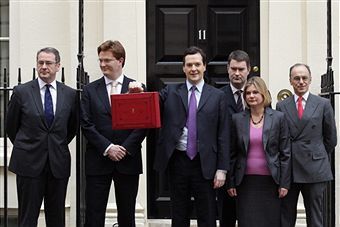 “I am announcing today that the Government will consult on merging the
operation of National Insurance and Income Tax.”
“I am announcing today that the Government will consult on merging the
operation of National Insurance and Income Tax.”
The word ‘consultation’ in the Budget drew the longest, loudest sigh from me. Some commentators had hinted that Osborne was considering merging Income Tax and National Insurance Contributions (NICs), which would be a fantastic move towards simplifying our tax system. Of all the pre-Budget leaks, this was one that sounded truly exciting and innovative. But, alas, this idea is only in infancy and all that was promised was a consultation. Of course, the Chancellor can’t rush into this. He has to get this right if it goes ahead, so a consultation is probably prudent. But this also gives him the option not to deliver at the end of it all. We didn’t need a final scheme, but the hype suggested something a little more concrete than having a think about the issue.
If Osborne isn’t careful he could hit workers in certain income brackets in unexpected and possibly unfair ways: the ASI have a nice little table showing how it could look. However, if he makes this change, the payoff is that it will drastically simplify the system, cut the cost of HMRC administering it and reduce costs for employers.
And that’s not all, as James Forsyth pointed out on this blog on Sunday:
‘Flagging up to the electorate that the basic rate of tax is 31p not 20p would be a big step to changing how people view their relationship with the state and whether or not they believe they would be better off with public spending increases or tax cuts.’
The justification for keeping the two taxes separate used to be that paying NICs made you eligible to receive certain benefits. However, this is an outdated concept that unnecessarily complicates things and it’s time to drag our tax system into the 21st Century.
After his initial announcement, Osborne made this rather odd comment:
“I am not proposing we extend National Insurance to pensioners, or to other forms of income, or that we abolish the contributory principle.”
While some kind of measure to address the problem with pensioners is clearly necessary, that statement has left many scratching their heads. Most people thought that getting rid of National Insurance would mean accepting the death of the contributory principle, which has largely been undone over the years and is being finished off by changes Iain Duncan Smith is making to pensions. Whether or not the contributory principle is a good or a bad thing in theory, in practice it is probably going the way of the dodo. The Chancellor needs to combine Income Tax and NICs without producing something more complicated than what he started with.
Like many other things in the Budget, we are going to have to wait to see some more detail before we know what Osborne’s really offering. Like a naughty schoolboy who hadn’t quite finished his homework, he left almost as many questions as he answered. Combining Income Tax and NICs will take a lot of work to get right; let’s hope that the mere suggestion of it is enough to trigger a wider debate about how much money the taxman takes out of our pay-cheque and what we’re really getting in return.
Matthew Sinclair is Director of the Taxpayer’s Alliance.






Comments